Ryan Holiday's Stoic Series
With the help of the publisher, Shelf Awareness celebrates the timely and popular Stoic series from Ryan Holiday and Stephen Hanselman.
With the help of the publisher, Shelf Awareness celebrates the timely and popular Stoic series from Ryan Holiday and Stephen Hanselman.
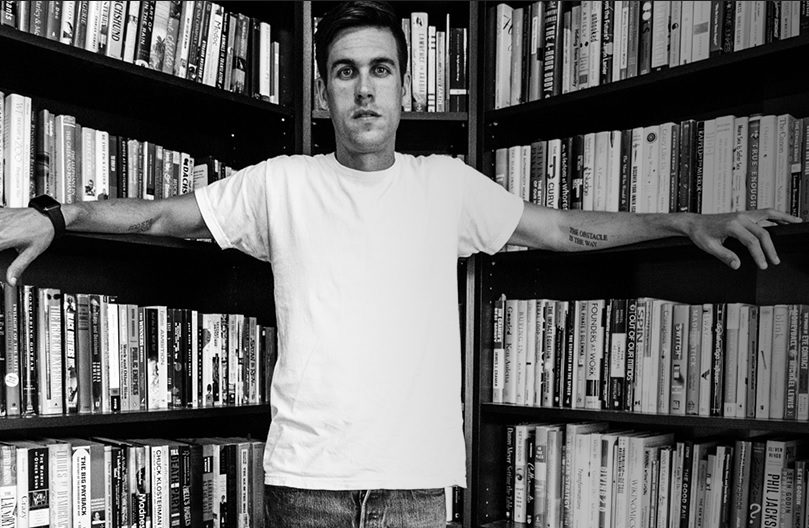 |
|
| Ryan Holiday | |
In the last year, Ryan Holiday's four books on stoicism, two of which were co-authored with Stephen Hanselman, have been embraced by a range of sports stars, celebrities, politicians, businesspeople and many, many general readers. In 2017, the books sold more than 300,000 copies in the U.S., and since the first title, The Obstacle Is the Way, was published in 2014, they've sold a combined total of more than a million copies worldwide in the English language. The books' popularity is especially striking because they present the modern adaptation of a philosophy with roots that go back more than 2,000 years. And it's not an "easy" philosophy: it posits that hardship and adversity should be met with determination and strength, without complaint, and that every obstacle is an opportunity for improvement. Although that's a persuasive approach that resonates in many eras and situations, it may also be striking a chord in the current political climate with its message of "persist and resist" no matter how bad a situation seems. (More on each of the four titles in the article below; following that, Ryan Holiday revealingly discusses his Stoic and general interests.)
In just one measure of the books' wide-reaching influence, their message has resonated throughout the sports world. Consider that in 2017 alone, the Stoic titles contributed to the national championship winners in three different professional sports. Early in the year, the New England Patriots, bolstered after reading both Ego Is the Enemy and The Obstacle Is the Way, won the Super Bowl in a record-breaking, come-from-behind victory.
 |
|
| Stephen Hanselman | |
Then in spring 2017, David West, who took a pay cut to join the Golden State Warriors, read Ego Is the Enemy before the NBA Finals, and used it and his selfless playing style to beat the defending champs, LeBron James and Cleveland Cavaliers.
And finally last fall, the Houston Astros, whose hitting coach, Jeff Albert, had been giving copies of Ego Is the Enemy to his players since January (and asked for some copies in Spanish), won a hard-fought World Series, the team's first-ever championship.
The business world is a strong supporter, too. One measure: The Daily Stoic spent 13 weeks on the business bestseller list of the Wall Street Journal, which gave it a rave review.
Bookseller Support
Some of the biggest independent bookstores are major fans of the Stoic series. Allison Hill, CEO of Vroman's, Pasadena, and Book Soup, West Hollywood, Calif., says, "Ryan Holiday's books are consistently on our Best of Business display at Vroman's and The Obstacle Is the Way is one of my favorites. Holiday views leadership through a philosophical lens, drawing on classic texts to elevate the modern leadership conversation. The result is energizing."
Abby Fennewald, director of marketing and publicity at BookPeople, Austin, Tex., comments: "Ryan is one of our absolute favorite local authors. He really knows what he's doing. His books are consistently among the bestsellers in the store in their categories."
And at Politics and Prose, Washington, D.C., buyer Mark LaFramboise notes that the store has had "great success" with corporate sales of the Stoic books... These are money in the bank."
Social Media Reach
Booksellers and librarians should know, too, that Holiday and the books have a striking social media presence that is helping to spread the message. The Daily Stoic has 121,000 followers on Facebook, 150,000 followers on Instagram, and 60,300 followers on Twitter. Holiday himself has more than 43,000 followers on Facebook, 62,000 on Instagram, and 235,000 on Twitter. In addition, the Daily Stoic newsletter has 120,000 subscribers, who receive an e-mail each weekday of the year with an original meditation penned by Holiday.
In addition, the Ryan Holiday Reading Recommendations list has 91,000 subscribers, many of whom are book lovers and correspond with him. The list is coordinated with BookPeople, which is wonderfully appropriate: the Stoic books grew out of the discussions Holiday had with list members.
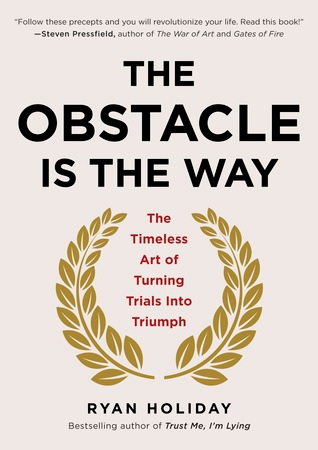 The Obstacle Is the Way: The Timeless Art of Turning Trials into Triumph by Ryan Holiday (Portfolio, $25, 9781591846352, May 1, 2014). Almost 2,000 years ago, Roman Emperor Marcus Aurelius wrote: "The impediment to action advances action. What stands in the way becomes the way." Stoic philosophy advocates enduring hardship and adversity with determination and strength. To the stoic, a new obstacle is an opportunity for improvement.
The Obstacle Is the Way: The Timeless Art of Turning Trials into Triumph by Ryan Holiday (Portfolio, $25, 9781591846352, May 1, 2014). Almost 2,000 years ago, Roman Emperor Marcus Aurelius wrote: "The impediment to action advances action. What stands in the way becomes the way." Stoic philosophy advocates enduring hardship and adversity with determination and strength. To the stoic, a new obstacle is an opportunity for improvement.
Ryan Holiday's The Obstacle Is the Way was his first offering of ancient wisdom distilled for the modern reader. To control what we can control, to surf life's many waves instead of being crushed by them--these are all admirable goals, ones that have found fans in high places. Many successful figures throughout history have harnessed the strength of stoicism, including John D. Rockefeller, Amelia Earhart, Ulysses S. Grant and Steve Jobs.
Today's stoic successes run the gamut from politics/film (Arnold Schwarzenegger), music (LL Cool J), and, to an incredible extent, sports. It's not surprising that professional athletes and coaches would find stoicism useful: physical pain, frequent losses, and the need for constant training make it an almost required philosophy. The Obstacle Is the Way has been a touchdown success among NFL coaches, players and sportscasters, including Patriots coach Bill Belichick. Besides its popularity with athletes (as outlined in this Sports Illustrated article), Holiday's book was featured on a popular TED Talk by author Tim Ferriss, which has been viewed more than 4.7 million times. The Obstacle Is the Way has sold more than 428,000 copies and been translated into 17 languages. 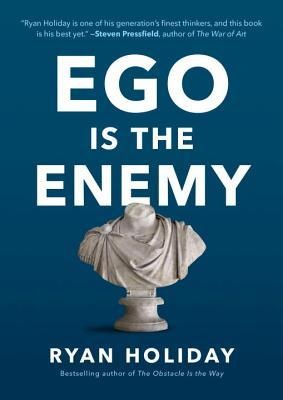 Ego Is the Enemy by Ryan Holiday (Portfolio, $25, 9781591847816, June 14, 2016). In his prologue for Ego Is the Enemy, Ryan Holiday writes "While the history books are filled with tales of obsessive visionary geniuses who remade the world in their image with sheer, almost irrational force, I've found that history is also made by individuals who fought their egos at every turn, who eschewed the spotlight, and who put their higher goals above their desire for recognition."
Ego Is the Enemy by Ryan Holiday (Portfolio, $25, 9781591847816, June 14, 2016). In his prologue for Ego Is the Enemy, Ryan Holiday writes "While the history books are filled with tales of obsessive visionary geniuses who remade the world in their image with sheer, almost irrational force, I've found that history is also made by individuals who fought their egos at every turn, who eschewed the spotlight, and who put their higher goals above their desire for recognition."
The elevation of the self is anathema to stoicism. Grandiose self-promotion, posits Ego Is the Enemy, is effectively self-sabotage at every stage of one's career. Early on, ego interferes with the ability to learn new skills and practice one's talents. Later, ego can make it difficult to find fault in one's own actions and recognize problems. Ego also makes it more troublesome to learn and recover from failure.
Ego Is the Enemy explores the lives of successful people whose personal victories were in part achieved by taking their person out of the way. George Marshall, Jackie Robinson, Katharine Graham, Bill Belichick and Eleanor Roosevelt, among others, changed the world by conquering their own egos. Holiday's book promises to teach that same stoic strength, to give the skills necessary to survive in the age of reality TV and personal brands. It has sold more than 288,000 copies.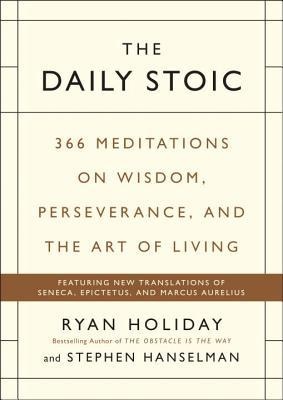 The Daily Stoic: 366 Meditations on Wisdom, Perseverance, and the Art of Living by Ryan Holiday and Stephen Hanselman (Portfolio, $25, 9780735211735, Oct. 18, 2016). With the help of literary agent, publisher and Harvard Divinity School graduate Stephen Hanselman, Ryan Holiday makes it easier than ever to apply stoicism to everyday life. The Daily Stoic features a year of quotes from stoicism's greatest practitioners: Marcus Aurelius, the playwright Seneca, the philosopher/slave Epictetus, as well as lesser-known figures like Zeno, Cleanthes and Musonius Rufus.
The Daily Stoic: 366 Meditations on Wisdom, Perseverance, and the Art of Living by Ryan Holiday and Stephen Hanselman (Portfolio, $25, 9780735211735, Oct. 18, 2016). With the help of literary agent, publisher and Harvard Divinity School graduate Stephen Hanselman, Ryan Holiday makes it easier than ever to apply stoicism to everyday life. The Daily Stoic features a year of quotes from stoicism's greatest practitioners: Marcus Aurelius, the playwright Seneca, the philosopher/slave Epictetus, as well as lesser-known figures like Zeno, Cleanthes and Musonius Rufus.
Holiday and Hanselman give a quote for each day of the year and advice on how to apply said ancient wisdom to modern life. There is a reason George Washington, Frederick the Great and Ralph Waldo Emerson advocated stoicism, and why modern CEOs, football coaches and celebrities have followed that same path. Stoic philosophy holds the answers not only to bearing the many turmoils of life, but thriving in spite of--or even because of--them.
The Daily Stoic has been recommended by the likes of Arianna Huffington, Billy Bush, Debra Messing and a slew of senators--Marco Rubio has frequently mentioned it, and Ben Sasse discusses it in his book, The Vanishing American Adult. More than 253,000 readers have been given what Maria Popova, editor of Brain Pickings, calls "a generous gift of guidance on modern living culled from a canon of wisdom hatched long ago."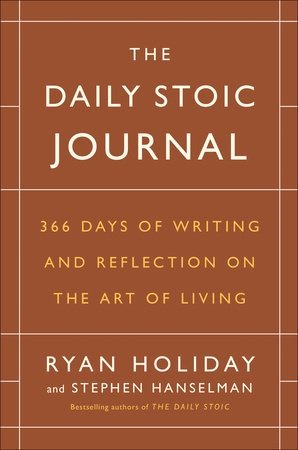 The Daily Stoic Journal: 366 Days of Writing and Reflection on the Art of Living by Ryan Holiday and Stephen Hanselman (Portfolio, $27, 9780525534396, Nov. 14, 2017). For those who have absorbed The Obstacle Is the Way, Ego Is the Enemy and The Daily Stoic, The Daily Stoic Journal is the next step in applying stoicism to everyday life.
The Daily Stoic Journal: 366 Days of Writing and Reflection on the Art of Living by Ryan Holiday and Stephen Hanselman (Portfolio, $27, 9780525534396, Nov. 14, 2017). For those who have absorbed The Obstacle Is the Way, Ego Is the Enemy and The Daily Stoic, The Daily Stoic Journal is the next step in applying stoicism to everyday life.
This hardcover journal, made with Smyth-sewn binding (allowing the book to open perfectly flat without falling apart) offers weekly exercises for practicing the ancient wisdom of the stoics. These practices are paired with quotes from Marcus Aurelius, Seneca and Epictetus, among others, along with questions to gauge one's progress.
In 52 weeks, readers can master 2,000 years of philosophy. Even without having read Holiday and Hanselman's previous works on the subject, this journal makes a useful gift for those seeking a deeper understanding to their lives. It has sold more than 36,000 copies.
Ryan Holiday graciously and revealingly answers questions posed by Shelf Awareness:
On your nightstand now:
Billie Jean by Billie Jean King.
Favorite book when you were a child:
Doc Holliday by Matt Braun. I bought it at the checkout stand of a Raley's Grocery store in Sacramento. He had the same last name as me! In retrospect I know that great books are not usually sold at grocery stores, but to me, at the time, it had everything I wanted. Action. Sarcasm. Wit. History. I would never re-read it because I want it to stay exactly as it was in my mind as a 9 year old. Also, I can't believe my parents let me read it at age 9.
Your top five authors:
1. Seneca. I did a piece for the New York Times on the relevance of Seneca in today's political landscape. He was a Stoic philosopher who found himself--for mixed motives--serving in the court of Nero. It was a bargain for power that did not work out well, but remains a powerful lesson. His letters are brilliant and wise, no matter how much trouble he had living up to their advice. His plays are also quite good, and are probably underrated compared to Sophocles or Euripides.
2. Rich Cohen. I'll read anything Rich Cohen writes. Books about baseball, books about fruit in South America, books about Jewish gangsters, books about the Rolling Stones. Everything he does it brilliant, hilarious and totally in his own unique style. He was my inspiration as I wrote Conspiracy, my book about Peter Thiel and his war on Gawker.
3. Walker Percy. The Moviegoer is my favorite novel. I think it perfectly captures the angst of the 21st century...despite being written about mid-19th century New Orleans. Walker Percy came from a long line of writers and his best friend growing up was Shelby Foote, a wonderful historian. Also a great Stoic connection and thread running through Percy's work.
4. Robert Greene. I think Robert is our greatest living strategic mind and in 100 years or 500 years his books will be read the way The Prince is read today. People will still be partly horrified but they won't be able to say he's wrong. To me, that's high praise.
5. Stefan Zweig. I've not read much of Zweig's fiction but his series of biographies, of Marie Antoinette, Magellan, Nietzsche and most of all Montaigne deserve to find a new audience today. Pushkin Press has brought a few editions back out and I hope bookstores will carry them. His memoir The World of Yesterday is also very good.
Book you've faked reading:
I've never read 1984. And it's one of those books you're so supposed to have read that I feel like I'd be embarrassed to be seen with it publicly, like I was going back to get my GED or something. I've read some Orwell (he has a great little essay on writing), think he's brilliant and therefore appreciate the irony--or doublespeak--of pretending to have read him.
Book you're an evangelist for:
Meditations by Marcus Aurelius. The single most remarkable book in all of Western Literature. It's the most powerful man in the world recording his private thoughts and exercises about how he can be better, and not be crushed by the pressures and temptations of his job. Lord Acton's line about how absolute power corrupts absolutely and Marcus Aurelius is one of the few exceptions to that rule. To me, what's in Meditations--Stoic philosophy--is the explanation why. I think the Gregory Hays translation for the Modern Library is the best translation but it's hard to go wrong with any of the newer, more recent editions. It's just an incredible book that will change the life of anyone who reads it.
Book you've bought for the cover:
Have you seen the cover of Satan is Real by the Louvin Brothers? It's kitsch but brilliant, scary and hilarious at the same time.
Book that changed your life:
All the Stoics, of course, Marcus Aurelius most of all. Robert Greene's 48 Laws of Power showed me how the world works but also--because I was lucky enough to be Robert's research assistant on some of his later books--from it I learned how a writer can show the reader how the world works.
Favorite line from a book:
"Accept it without arrogance, let it go with indifference." Marcus Aurelius. Again, it's so stunning given the position of the man who wrote. This was a guy who was named emperor of Rome...and immediately and unsolicitedly decides to make his step-brother co-emperor. He thought it was the right thing to do. This was a man who experienced the highs and lows of life and he was determined to let neither change him.
Book you most want to read again for the first time:
As I said about the Matt Braun pulp paperback I earlier, it is a wonderful experience to read something at an age when the world is fresh and new. At the same time, reading something again--not for the first time but for the second time--is almost always more illuminating. It is sad that we read The Great Gatsby for the first time so young. So many of the classics should be pushed later so we can appreciate what they actually mean.